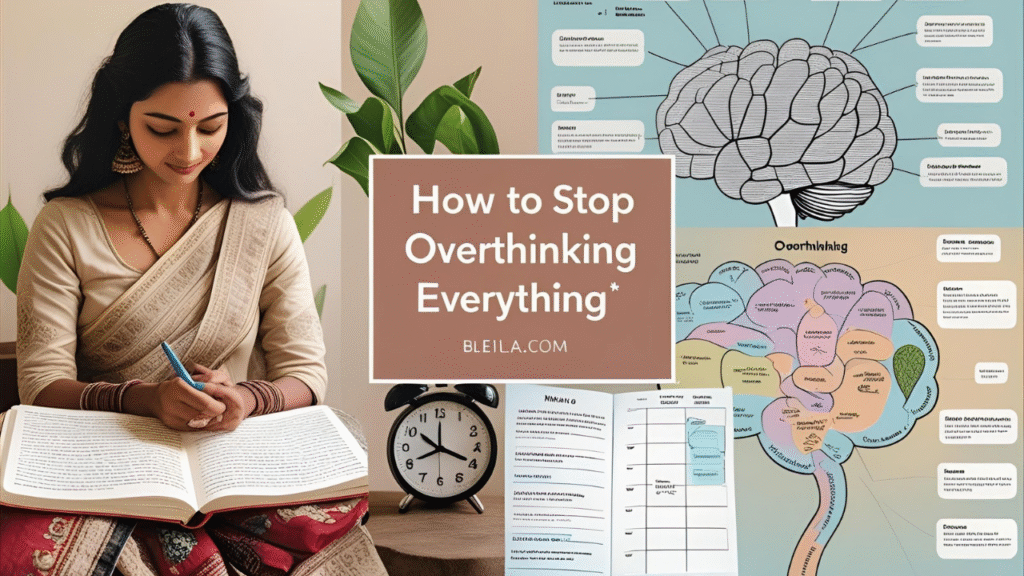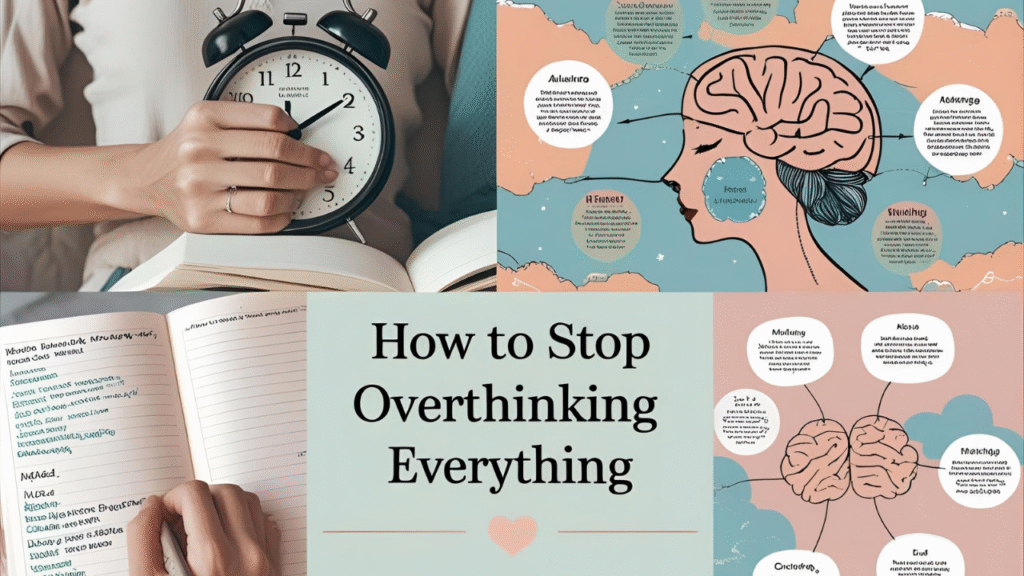Overthinking is one of the most exhausting habits we develop without realizing it. Whether you’re lying awake replaying a conversation, struggling to make a decision, or constantly fearing the worst-case scenario—overthinking can quietly take over your peace of mind. In fact, studies show that chronic overthinking increases stress, anxiety, and even leads to sleep disorders.
If you’re tired of living in your head and want to break free, this guide is for you. We’ll explore what overthinking really is, why we do it, and—most importantly—how to stop overthinking everything in your life through realistic, science-backed strategies.
From mindset shifts to daily habits, these tools will help you step out of the noise and into clarity.

✅ What Is Overthinking & Why Do We Do It?
Overthinking means dwelling on the same thoughts repeatedly, especially around problems, regrets, or decisions. It often sounds like:
“What if I had done that differently?” or “I need to be sure before making a move.”
This habit forms when we fear uncertainty or failure. Your brain tries to “solve” emotional discomfort by analyzing every detail, but it ends up doing the opposite—causing mental clutter and confusion.
Common Triggers of Overthinking:
- Fear of making the wrong choice
- Low self-esteem
- Perfectionism
- Past trauma or failure
- External pressure (family, career, social media)
Pro Tip: If you catch yourself thinking the same thing over and over, it’s a sign your brain isn’t solving—it’s looping.
✅ 1. Start Journaling to Clear Mental Clutter
Writing your thoughts down forces you to organize them. When thoughts are on paper, they stop bouncing around in your head. Journaling helps you separate real concerns from irrational ones.
Try This:
Spend 10 minutes each morning or night writing down everything on your mind. Don’t filter. Then underline what you can control—and release the rest.
Budget: Just a notebook and pen ($5 / €5)
Pro Tip: Use prompts like “What’s worrying me?” or “Is this fact or fear?”
✅ 2. Use the 5-5-5 Rule for Decisions
Overthinkers often fear making the “wrong” move. The 5-5-5 Rule asks:
- Will this matter in 5 days?
- Will it matter in 5 months?
- Will it matter in 5 years?
This instantly puts things in perspective. Most of what we obsess over won’t matter a year from now.
Budget: Free mental tool
Pro Tip: Write it down next to each big thought—you’ll often find your stress isn’t worth it.

✅ 3. Practice the “Name It to Tame It” Technique
A method used in cognitive therapy, this technique involves naming what you’re feeling. Instead of spinning in a thought like “I can’t believe I said that…”, say, “I’m feeling anxious because I fear I embarrassed myself.”
Labeling emotions calms the brain and reduces the power of those thoughts.
Budget: Free, internal work
Pro Tip: Pair it with a deep breath to create calm instantly.
✅ 4. Set a 10-Minute Overthinking Timer
If you can’t stop thinking about something, schedule worry time. Set a timer for 10 minutes. Let yourself overthink—but once the time’s up, move on. This creates structure around chaos.
Budget: Use a phone timer or alarm
Pro Tip: Physically get up and change locations when the timer ends—movement breaks the loop.
✅ 5. Limit “What If” Questions
“What if it goes wrong?” “What if they don’t like me?” These questions keep you paralyzed. Try replacing “What if” with “Even if”:
- Instead of “What if I fail?”, say “Even if I fail, I’ll learn something.”
This one shift turns fear into confidence.
Budget: Free mindset tool
Pro Tip: Say it out loud—it sounds less scary than it feels inside your head.
✅ 6. Reduce Information Overload
Overthinkers often read multiple opinions, reviews, or articles before making decisions. But more information doesn’t always mean better clarity—it leads to analysis paralysis.
Set a limit: 3 sources or 15 minutes max. Then decide.
Budget: Free, just discipline
Pro Tip: Unsubscribe from excess newsletters and silence non-essential notifications.

✅ 7. Meditate for 5 Minutes a Day
Meditation isn’t just for monks. Even 5 minutes a day of focused breathing or mindfulness lowers cortisol, slows heart rate, and rewires your thinking patterns.
Apps like Headspace and Insight Timer offer free guided sessions.
Budget: $0–$15/month (or free versions available)
Pro Tip: Do it right after waking up—before your thoughts take over.
✅ Final Thought: How to Stop Overthinking and Start Living Fully
Overthinking doesn’t mean you’re weak—it means your brain is trying to protect you. But protection isn’t the same as peace. Constant mental loops steal time, joy, and clarity from your life.
To stop overthinking everything in your life, you need more than just awareness—you need daily action. Start small: pick one strategy from above and practice it for a week. Whether it’s journaling, time-limited worrying, or a 5-minute meditation, it all adds up.
The goal isn’t to silence your mind completely—it’s to create space between thoughts and truth. To see what matters, and let go of the rest.
Because life isn’t meant to be lived inside your head—it’s meant to be felt, explored, and embraced in the present moment.
🙋♀️ FAQs
Q1. Is overthinking a mental illness?
No, overthinking itself isn’t a mental illness, but it’s often linked to conditions like anxiety, OCD, or depression. If it’s chronic and interfering with daily life, consider speaking to a therapist.
Q2. How do I know if I’m overthinking or just being careful?
Overthinking feels like spinning wheels—repeated thoughts with no decision or peace. Being careful leads to a thoughtful conclusion. If you feel stuck, you’re likely overthinking.
Q3. Can overthinking cause physical symptoms?
Yes. It can lead to headaches, muscle tension, fatigue, and insomnia. Mental stress directly impacts physical health.
Q4. Can overthinking ruin relationships?
Yes. It often leads to assumptions, jealousy, or emotional distance. Clear communication and self-awareness are essential for stopping this.
Q5. Is it possible to stop overthinking permanently?
You can’t completely stop thoughts—but you can train your brain to let go faster and focus better. Over time, it becomes easier to manage.


